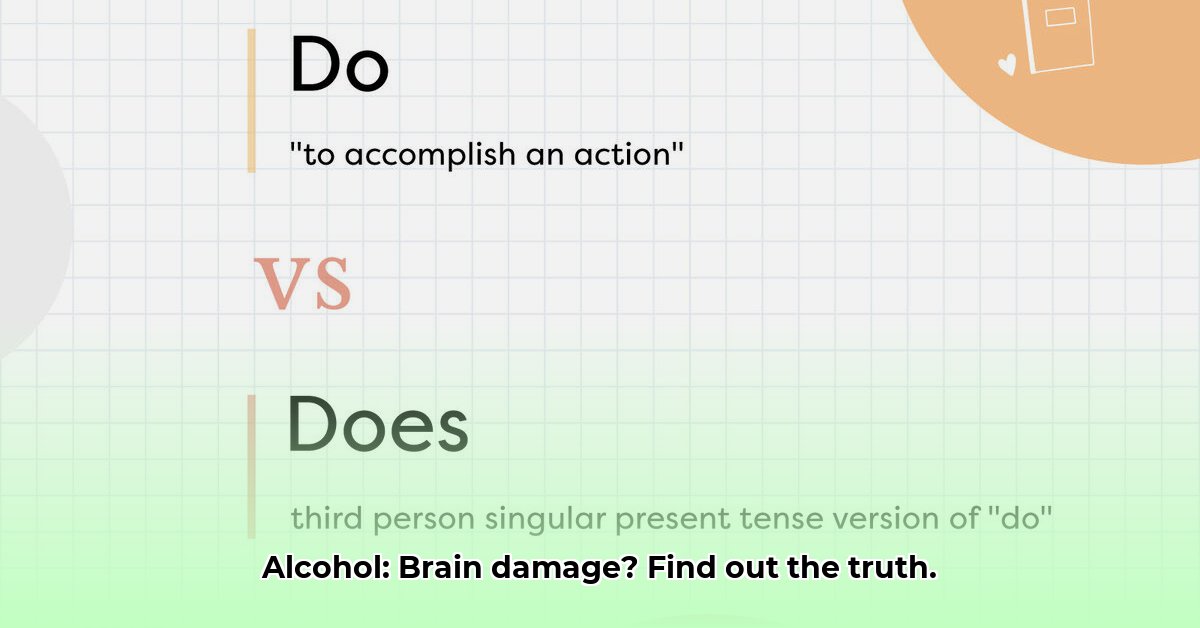
Does Alcohol Directly Kill Brain Cells?
Eish, the old wives' tale about booze killing brain cells – is it true? Not exactly. Alcohol doesn't directly kill brain cells like a poison, but it acts more like a disruptive force, interfering with how your brain functions. Think of it as a mischievous imp throwing spanners in the works of your brain's complex machinery. The severity of the disruption depends on how much you drink and how often.
How Alcohol Affects Your Brain
Alcohol's not your brain's best friend. It behaves as a neurotoxin (a substance harmful to nerve cells), disrupting brain function. This can lead to anything from a dodgy memory ("Where did I park the car?") to severe neurological problems, depending on your drinking habits.
The Developing Brain's Vulnerability
Your brain is particularly sensitive to alcohol, especially during adolescence and pregnancy. Drinking during these periods can cause permanent damage. Conditions like Fetal Alcohol Spectrum Disorders (FASDs) can have devastating lifelong consequences for both the child and family.
The Dangers of Heavy Drinking
Here's where things get serious. Regular heavy drinking is strongly linked to brain shrinkage, particularly in areas vital for memory and learning. This isn't just about feeling a bit fuzzy; it's actual physical damage. Over time, this can cause serious conditions like Wernicke-Korsakoff syndrome, leading to extreme memory loss and confusion.
Binge drinking – guzzling large amounts of alcohol in a short time – is especially risky. It puts immense strain on your brain and body, causing short-term problems (like a killer hangover) and long-term issues, impacting many aspects of your health.
Moderate Drinking: A Murkier Area
What about a couple of drinks now and then? Some studies hint that moderate drinking might slightly lower the risk of heart problems in some individuals. But the impact on brain health is still debated. Even moderate drinking might subtly affect cognitive function over time, especially as you age. These changes are often slow and hard to spot early on.
Beyond Alcohol: The Bigger Picture
The alcohol-brain relationship is complex. Alcohol's effects aren't only about direct cell damage. Heavy drinking often causes nutritional deficiencies that further impair brain function. Other factors such as genetics, overall health, and lifestyle choices all contribute. Scientists are still actively studying how different drinking habits affect long-term brain health.
Protecting Your Brain: What You Can Do
Here's the takeaway:
- Know your limits: Pay attention to your body's response and stick to safe drinking limits. Responsible drinking is key.
- Seek help if needed: If you're struggling with alcohol, don't hesitate to reach out for professional help. There's support available.
- Protect the developing brain: Avoid alcohol completely during pregnancy and adolescence.
A Quick Summary
| Alcohol Consumption | Immediate Effects | Long-Term Potential Problems |
|---|---|---|
| Moderate | Mild mood changes | Possible subtle cognitive decline, increased cancer risk |
| Heavy | Significant impairment | Brain shrinkage, Wernicke-Korsakoff syndrome, liver damage |
| Binge | Risk of alcohol poisoning | Severe, potentially permanent brain damage |
Disclaimer: This information is for general knowledge. Always consult a doctor or healthcare professional for personalised advice.
Moderate Drinking and Long-Term Brain Health: Unanswered Questions
Key Takeaways:
- While heavy drinking clearly harms the brain, moderate drinking's long-term effects on brain health are still unclear and actively researched.
- Age, genetics and pre-existing health conditions influence alcohol's impact.
- Responsible drinking habits and a healthy lifestyle are crucial for brain health.
The Ongoing Debate
So, is that daily glass of wine harmful? The evidence isn't conclusive. Many studies yield conflicting results. Some suggest potential benefits for older adults regarding dementia risk reduction, while others show even moderate drinking can cause slight brain shrinkage.
Why the confusion? Study methodologies vary, as do populations and the control for lifestyle factors. This makes it hard to isolate alcohol's specific role.
Heavy Drinking: The Unmistakable Danger
Heavy or binge drinking carries clear risks. It's strongly linked to Wernicke-Korsakoff syndrome and increased dementia risk. Long-term heavy drinking causes brain shrinkage, impacting memory and learning. Alcohol poisoning, a life-threatening condition, can cause irreversible brain damage.
Individual Variations
Alcohol's impact differs from person to person, influenced by age, genetics, and pre-existing health issues. Young brains are far more vulnerable. Genetic predispositions also influence alcohol metabolism and brain response. Existing health conditions can worsen alcohol's negative effects.
Taking Control of Your Brain Health
Responsible drinking is key. Stick to recommended limits and heed your body's signals. If concerned, talk to your doctor. A healthy lifestyle, including exercise and a balanced diet, are crucial elements in brain health.
Future Research: Filling the Gaps
Although we've made progress, more research is needed, particularly on moderate drinking's long-term consequences. This will help tailor preventative strategies to different age groups and health profiles.